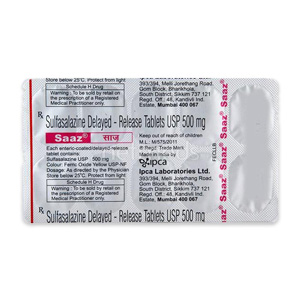
We accept Bitcoins
Get 10% discount!!!
Sulfasalazine (Saaz)

The image may differ from the actual product
Sulfasalazine (Saaz) is used to treat various inflammatory conditions of the joints (rheumatoid arthritis, psoriatic arthritis, ankylosing spondylitis), skin (psoriasis), and bowel (ulcerative colitis, Crohn’s disease).
Sulfasalazine (Saaz) is an anti-inflammatory drug commonly prescribed to manage autoimmune and inflammatory disorders. It is effective in treating rheumatoid arthritis, ulcerative colitis, Crohn's disease, and ankylosing spondylitis. The medication helps to reduce inflammation in the affected areas, leading to symptom relief and improved quality of life. Sulfasalazine is a slow-acting medication, and its full effects may not be seen for several weeks after starting treatment.
Uses of Sulfasalazine (Saaz)
- Rheumatoid Arthritis: Sulfasalazine helps in managing rheumatoid arthritis (RA), an autoimmune disorder that causes pain, swelling, and stiffness in the joints. It works by regulating the immune system, reducing inflammation, and preventing joint damage.
- Ulcerative Colitis: This condition involves inflammation in the large intestine. Sulfasalazine reduces the inflammation, providing relief from symptoms like bleeding, diarrhea, and abdominal pain.
- Crohn’s Disease: Sulfasalazine treats Crohn’s disease, an inflammatory bowel condition affecting the digestive system. It helps reduce inflammation and alleviates pain and discomfort.
- Ankylosing Spondylitis: Sulfasalazine can be used to treat ankylosing spondylitis, a type of arthritis affecting the spine. It helps reduce pain and stiffness by decreasing inflammation in the spinal joints.
How Sulfasalazine Works
Sulfasalazine works by inhibiting chemicals that cause inflammation and tissue damage in the body. In rheumatoid arthritis, it regulates the immune system, preventing it from attacking the body’s joints. In conditions like ulcerative colitis and Crohn’s disease, it reduces intestinal inflammation, providing relief from digestive discomfort.Side Effects
Sulfasalazine is generally well-tolerated, but it may cause side effects. Common side effects include:- Diarrhea
- Gastrointestinal discomfort
- Headache
- Loss of appetite
- Nausea
- Low sperm count (oligospermia)
- Vomiting
- Weight loss
How to Use Sulfasalazine (Saaz)
Sulfasalazine (Saaz) should be taken as prescribed by your doctor. It is usually taken with food to minimize stomach discomfort. Do not chew, crush, or break the tablet. Swallow it whole, and drink plenty of fluids to stay hydrated.Safety Advice
- It is unsafe to consume alcohol while taking Sulfasalazine (Saaz), as it may increase the risk of side effects.
- Sulfasalazine is generally considered safe during pregnancy, but consult your doctor before use.
- It is not recommended for breastfeeding mothers as it may pass into breast milk and harm the baby.
- Sulfasalazine does not usually impair your ability to drive, but be cautious if you experience side effects like dizziness.
- Patients with kidney disease should use Sulfasalazine with caution, as dose adjustments may be needed.
- It is probably unsafe to use Sulfasalazine in patients with liver disease. Consult your doctor before use.

 English
English 









